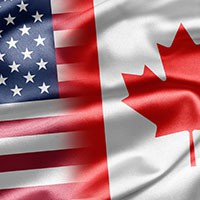Tax Facts: Cross-Border Income Compliance

Dr. Dean Smith
In an increasingly global economy, more and more Canadians find themselves vacationing, owning property, and earning income in the U.S. If your client has financial stakes across the border, it’s important to know the tax implications associated with them. This can include cross border contract work and owning and renting vacation properties.
The following examples explore two common scenarios that your Canadian clients may encounter across the border, *Excerpted from Knowledge Bureau’s Cross Border Taxation certificate course , part of the MFA™ - Business Services Specialist Designation .
Case Study 1 – Contract work: George is a Canadian citizen and resident who was contracted by two separate U.S. companies to perform certain employment duties over a 3-month period. While working in the U.S., George was paid $5,500 and $6,600 respectively for the work that he did. Even though George’s total U.S. employment income is over $10,000, because he was paid by two separate companies and each company paid him less than $10,000, under the provision of Article XV:2, his U.S. employment income would be exempt from taxation in the U.S.
Case Study 2 – Owning and renting a vacation home: Alysha and her husband Anthony love to vacation in Florida so they decided to jointly purchase a vacation home just outside Miami where they stay 30 days of the year. The expenses to maintain their home in Canada, as well as the property in Florida, were getting a little overwhelming for them so at the beginning of the following year they decided to rent out their Florida home on a short-term basis in the months that they don’t use it.
Most of their renters stay 1 to 2 weeks at a time and are tourists to the Miami area. They receive rent of approximately $1,500 per month but incur expenses of approximately $1,300 per month, including management fees of $200 per month (they pay a management company to manage the collection of the rental income and take care of the property while they are away).
Alysha and Anthony will each need to apply for an ITIN and file separate 1040NR returns claiming 50% of the rental income and expenses as well as 50% of the depreciation allowed. They will also need to exclude approximately 8% of the total expenses for the year as that is the personal use percentage (30/365).
The same is true for their Canadian tax returns. 50% of all income and expenses will be reported by both Alysha and Anthony but the amount of depreciation available to them may be limited depending on the amount of profit before depreciation.
What of clients working in the U.S. or expanding their business outside of Canada’s borders? Join Dr. Dean Smith , author of Knowledge Bureau’s Cross Border Taxation certificate course, partner with Cadesky and Associates LLP and the President of Cadesky U.S. Tax Ltd. at the Distinguished Advisor’s Conference where he’ll be discussing GLOBAL TAX COMPETITIVENESS: The Compliance Issues You Need to Know .
Additional Educational Resources: Knowledge Bureau offers Cross Border Taxation as a certificate course or as part of your MFA™ - Business Services Specialist Designation . Enrol or take a free trial today.
COPYRIGHT OWNED BY KNOWLEDGE BUREAU INC., 2019.
UNAUTHORIZED REPRODUCTION, IN WHOLE OR IN PART, IS PROHIBITED.